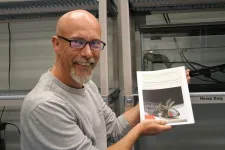(Press-News.org) Up to 1.7 million people could be living with dementia in England and Wales by 2040 – over 40% more than previously forecast – finds a new UCL-led study.
Previous studies, based on data up to 2010, showed that dementia incidence had declined in high-income countries. However, the new research, published in The Lancet Public Health, indicates that dementia incidence started to increase in England and Wales after 2008.
Based on this estimated upward incidence trend, researchers project that the number of people with dementia in England and Wales may be significantly higher than expected in the future.
According to previous research* in England and Wales, the number of people living with dementia was previously predicted to increase by 57% from 0.77 million in 2016 to 1.2 million in 2040.
However, the new research, funded by the UK Economic and Social Research Council, suggests that this figure could be as high as 1.7 million.
Researchers examined nine waves of data from people over the age of 50 and living in private households in England between 2002 and 2019, from the English Longitudinal Study of Ageing (ELSA).
They found that the dementia incidence rate (a measure that considers what percentage of the population in each age group has dementia) decreased by 28.8% between 2002 and 2008. However, it increased again by 25.2% between 2008 and 2016.
A similar non-linear pattern was observed across subgroups according to age, sex, and educational attainment.
Most notably, researchers found that disparities in the rate of dementia incidence was increasing between education groups, as there was both a slower decline in 2002-2008 and a faster increase after 2008 in participants with lower educational attainment.
If the incidence rate increases as fast as what was observed between 2008 to 2016 (a 2.8% increase per year) researchers predict that the number of people with dementia in England and Wales is set to increase to 1.7 million by 2040 – approximately twice the number in 2023. This compares to an estimate of one million people if dementia rates had continued to decline as previously reported.
Lead author, Dr Yuntao Chen (UCL Institute of Epidemiology & Health Care), said: “It is shocking to think that the number of people living with dementia by 2040 may be up to 70% higher than if dementia incidence had continued to decline.
“Not only will this have a devastating effect on the lives of those involved but it will also put a considerably larger burden on health and social care than current forecasts predict.
“Continued monitoring of the incidence trend will be crucial in shaping social care policy.”
Although an increase in dementia cases has often been attributed to an ageing population, the researchers also found that the rate of dementia onset within older age groups is also increasing.
Principal investigator, Professor Eric Brunner (UCL Institute of Epidemiology & Health Care), said: “Our research has exposed that dementia is likely to be a more urgent policy problem than previously recognised – even if the current trend continues for just a few years.
“We have found that not only is the ageing population a major driver of the trend in England and Wales but also the number of people developing dementia within older age groups is increasing.
“We don’t know how long this pattern will continue but the UK needs to be prepared so we can ensure that everyone affected, whatever their financial circumstances, is able to access the help and support that they need.”
James White, Alzheimer’s Society’s Head of National Influencing, commented: “Dementia is the biggest health and social care issue of our time. Statistics from this Lancet Public Health study are a stark reminder that, without action, the individual and economic devastation caused by dementia shows no sign of stopping.
“We know that one in three people born in the UK today will develop this terminal condition in their lifetime. With prevalence on the rise, improving diagnosis has never been more important. Everyone living with dementia must have access to a timely, accurate and specific diagnosis, and who you are or where you live should have no bearing on this. The figures also make it clear that pressure on our already struggling social care system is only going to increase. Quality social care can make a huge difference to people's lives, but we know that people with dementia – who are the biggest users of social care – are struggling with a care system that’s costly, difficult to access, and too often not tailored to their needs."
* https://www.bmj.com/content/358/bmj.j2856
END
Number of dementia cases could be 42% higher than previously estimated by 2040
2023-10-27
ELSE PRESS RELEASES FROM THIS DATE:
Youngest children in class with ADHD as likely to keep diagnosis in adulthood as older pupils, find scientists
2023-10-27
Lancet Psychiatry study shows for first time that younger children are no more likely to lose ADHD diagnosis over time than older classmates
Experts in charge of study examined data from more than 6,500 patients with ADHD
360 million people worldwide have been diagnosed with the condition according to WHO – with around a third under the age of 18
Children who are the youngest in their class to be identified with ADHD are just as likely to keep the diagnosis as older pupils in their year group, scientists have found.
Experts from the University of Southampton ...
Effective treatment for rare sight-threatening infection
2023-10-27
A drug candidate, based on pioneering UCL and Moorfields Eye Hospital research and currently under development by SIFI S.p.A., has been found to be highly effective in treating a rare sight-threatening eye infection in a new international clinical trial.
The findings, published in Ophthalmology, describe the efficacy and safety of the first drug candidate for the treatment of Acanthamoeba keratitis (AK), applying a novel and evidence-based treatment protocol.
AK is one type of microbial keratitis (corneal infection) – a condition ...
Controlling waves in magnets with superconductors for the first time
2023-10-27
Quantum physicists at Delft University of Technology have shown that it’s possible to control and manipulate spin waves on a chip using superconductors for the first time. These tiny waves in magnets may offer an alternative to electronics in the future, interesting for energy-efficient information technology or connecting pieces in a quantum computer, for example. The breakthrough, published in Science, primarily gives physicists new insight into the interaction between magnets and superconductors.
Energy-efficient substitute
"Spin waves are waves in a magnetic material that we can use to transmit information," explains ...
$1.5 million DOD grant will create virtual reality test to assess TBI in the field
2023-10-27
One of the most common injuries sustained by military personnel in recent conflicts has been traumatic brain injury, or TBI. In response to this, and the fact that military operations are increasingly being conducted by small teams in far-flung areas, researchers in the University of Arizona College of Medicine – Tucson’s Department of Psychiatry are working on a portable virtual reality system to assess TBI in the field.
Psychiatry professor William “Scott” Killgore, PhD, and his team in the Social, ...
Antibody-drug conjugate helps patients with metastatic non-small cell lung cancer live longer, delaying disease progression
2023-10-27
Treatment with datopotamab deruxtecan (Dato-DXd), a novel Trop-2 directed antibody-drug conjugate, was found to significantly improve progression-free survival in patients with metastatic non-small cell lung cancer, an improvement that was primarily driven by patients with non-squamous tumors.
These results from the TROPION-Lung01 Phase III trial, which compared the standard of care in second-line docetaxel, a type of chemotherapy, with Dato-DXd, an antibody drug conjugate, in patients with pretreated metastatic non-small cell lung cancer, were presented at the European Society for Medical Oncology 2023 Congress by Dr. Aaron ...
UTHSC cancer researcher part of $3 million collaborative project studying obesity-related cancer
2023-10-27
A University of Tennessee Health Science Center (UTHSC) researcher is a member of a prestigious team that has just received a highly competitive Endeavor Award totaling $3 million from The Mark Foundation for Cancer Research.
Liza Makowski, PhD professor in Hematology and Oncology at the UTHSC Center for Cancer Research, is a co-principal investigator on the award, which funds collaborative projects tackling complex challenges in the prevention, diagnosis, and treatment of cancer. Entitled “Inflammatory Drivers of The Obesity-Cancer Connection”, the project is led by principal ...
Common chemotherapy drugs don't work like doctors thought, with big implications for drug discovery
2023-10-27
A new study from the University of Wisconsin–Madison suggests that chemotherapy may not be reaching its full potential, in part because researchers and doctors have long misunderstood how some of the most common cancer drugs actually ward off tumors.
For decades, researchers have believed that a class of drugs called microtubule poisons treat cancerous tumors by halting mitosis, or the division of cells. Now, a team of UW–Madison scientists has found that in patients, microtubule poisons don't actually stop cancer cells from dividing. Instead, these drugs alter ...
SynGAP Research Fund awards $100,000 for investigating the impact of SYNGAP1 missense variants using structural bioinformatics
2023-10-26
TURKU, Finland – October 27, 2023 – The SynGAP Research Fund 501(c)(3) announced a $100,000 grant to researchers Pekka Postila and Olli Pentikäinen from the Institute of Biomedicine and InFLAMES Flagship at the University of Turku. Prof. Pentikäinen’s research focuses on molecular modeling and computer-aided drug discovery. Assoc. Prof. Postila is an expert on advanced molecular dynamics simulations of complex biomolecular systems. The dual research team was formed to study the structural effects of missense variants on the SynGAP protein, whose normal functioning ...
Something to chew on: Researchers look for connections in how animals eat and digest food
2023-10-26
Oct. 26, 2023
Media contacts:
Emily Gowdey-Backus, director of media relations, Emily_GowdeyBackus@uml.edu
Nancy Cicco, assistant director of media relations, Nancy_Cicco@uml.edu
UMass Lowell’s Nicolai Konow wants to bridge the gap between research on food processing and nutrient absorption.
“There is a divide between biomechanists, who study chewing and food transport, and physiologists, who examine what actually happens to food in the gastrointestinal tract,” said the assistant professor ...
Viral reprogramming of cells increases risk of cancers in HIV patients
2023-10-26
Viral infections are known to be a central cause of more than 10% of cancers worldwide. University of California researchers may have uncovered one of the key reasons why. Their findings were published today in PLOS Pathogens, a journal that reports groundbreaking work to advance understanding of how pathogens impact diseases such as cancer.
UC Davis Comprehensive Cancer Center researcher Yoshihiro Izumiya teamed up with Michiko Shimoda, who previously worked in the Izumiya Lab at UC Davis. Currently, she is a member of the Core Immunology Lab at UC San Francisco. Together, they led UC Davis researchers in the study of Kaposi’s sarcoma-associated herpesvirus (KSHV). The ...




